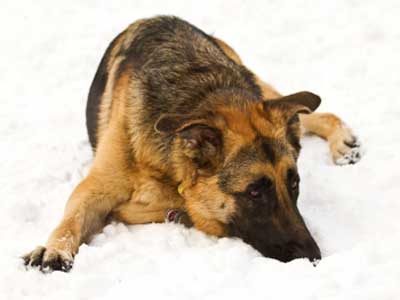Please Share This Article With Your Friends
This isn’t going to be good news…Did you know that bloat is the second biggest killer in dogs? It comes in a very close second behind cancer and sadly, there are certain breeds of dogs that tend to be at a much higher risk of suffering.
Dobermans, Great Danes and German Shepherds are the poor pups that suffer the most, but that’s not to say that other breeds won’t get it.
What Is Bloat?
Bloat is actually the term used to describe a number of things that take place in the gut of the dog. There is normally some sort of fluid, food or air that causes the stomach to fill, and this in turn puts a lot of pressure and shoving on a number of other organs inside the body. If left to its own devices and untreated, it can leave the dog with difficulty breathing as the stomach and gut crushed the lungs, and can even lead to a decreased blood supply to other parts of the body too.
It doesn’t sound nice and in reality, it’s not a nice thing to watch either.
What Are The Symptoms Of Bloat In Dogs?
There is of course, the obvious bloating around the gut that you need to keep an eye out for. You might find that your pup keeps trying to vomit but doesn’t bring anything up. They may show signs of being exhausted or weakness and probably won’t have much of an appetite. Perhaps they are even salivating more? They might feel cold to touch and have trouble with their breathing. Their heart might be beating faster than normal and their gums might look very pale compared to how they would normally look. At the end of it all, your poor pooch may collapse.
What Causes Bloat In Dogs?
Sadly, it can be a lot of things that eventually lead to the dog having trouble with bloat, or gastric dilatation-volvulus (GDV) ask is more technically known as. It could be something as simple as the dog eating too fast or only having a dry-food, one-big-meal-a-day kind of diet. They might overeat when they do eat, or even over drink after their meal. It can also be something that happens when the pup tries to exercise after a heavy meal, or have some sort of stress or trauma. As you can probably imagine, it can be quite hard to pinpoint exactly what the underlying cause could be.
What Are The Treatments For Dogs Who Suffer From Bloat?
The good news is that there are treatments available to fix your pup after bloat. If the stomach has been turned by the bloating, surgery can help to put things back to normality again. Plus there are things that you can do to help. Rather than feeding your pup one big meal daily, for example, try feeding them smaller meals, more regularly. Speak to your vet or Cheshire Dog Sitting expert if you have any concerns about how much or how often you should be feeding your pooch.
Please Share This Article With Your Friends
Photo provided by Maggie Smith / freedigitalphotos.net

